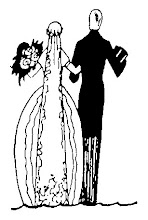
Lewis goes on to say we have knowledge of right and wrong, but we do not keep this objective standard. We feel the law of nature squeezing us into it's mold, but deep down we know we do not conform. These laws are different from mere instincts, because one does not usually have to decide between two different impulses. If the choice is to save a man that is drowning or be safe, then the moral law tells you deep inside to help him at the sacrifice of yourself. This moral law is stronger than the other impulses, and often supersedes it. If no set of moral laws were better than any others then what would be the difference between the Nazis and the United States society? Of course that is actually where the debate taken us, it is called multiculturalism. Which is a natural path from relativism.
CS Lewis then says that to get someone to this point will lead you to get them then to ask the question of where, if there is any objective standard, where does it come from? Who is the power behind the law? He is not yet speaking of Christianity, but just getting his readers to find out what the something is that is directing the universe. Today we call this pre-evangelism. He wants to direct his readers to a good, an absolute goodness, and if there is absolute goodness then this absolute goodness must hate what we do. He says God (absolute goodness) is the only comfort. He is also the supreme terror: the thing we most need and the thing we most want to hide from. Some people talk as if meeting the gaze of absolute goodness would be fun. They need to think again. They are still only playing with religion. Goodness is either the great safety or the great danger – according to the way you react to it. He said we start with dismay, and end in unspeakable comfort.
The next part of Mere Christianity is explaining what Christians believe. Now he switches gears. He takes the idea of atheism and turns it quickly to theism by showing its absurdity. Atheists have to prove that they are right, and all others are wrong. Atheists have to prove that in a world without meaning (to them) why is it we are always grasping for it? Dualism comes close to truth, but we have to rule it out too, because evil is a parasite of good (which Augustine said before Lewis). If this was not the case then we would have two competing gods and our choice of one over the other would not be good or bad or only our own personal preference. This rules out Dualism.
Christians believe that God created all things good, but evil was chosen. God made man with free-will which makes evil “possible," it also makes love, goodness and joy worth having. We then freely had the choice to love and unite to God out of that free will. The moment God made the self then there became a “possibility” of placing that self before God, and wanting to be like God as Satan said before our fall. This Satan put into the first creatures minds – to be like gods, find happiness apart from God. This is an impossibility. As Augustine said, “You made us for yourself and our hearts find no peace until they rest in you.” (Confessions, p.21) What do we do then with the moral filth in our lives in order to find peace with a good God?There had to be a God sized answer to that. God, in Christ, became man so that He could take upon Himself the wrong that we all know that we have done. He suffered and died in humiliation taking the wrath of God upon Himself. In order to redeem a people for Himself. He could do this as the God-Man, being the perfect sacrifice. Christ became our peace, so we would be united to God (Ephesians 2:14-18).
More tomorrow.........Lord willing..........Lynn


1 comments:
"Some people talk as if meeting the gaze of absolute goodness would be fun. They need to think again. They are still only playing with religion. Goodness is either the great safety or the great danger – according to the way you react to it."
So true...food for thought...good post. Tks-B
Post a Comment